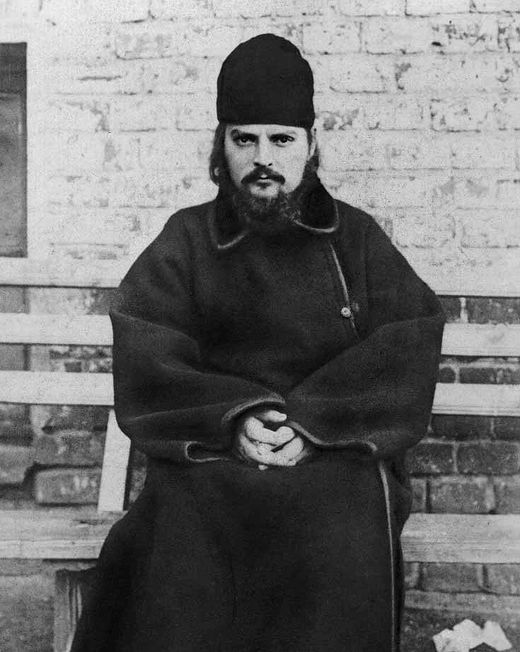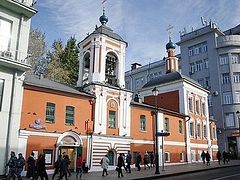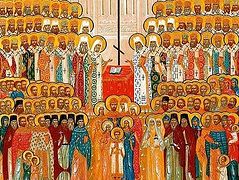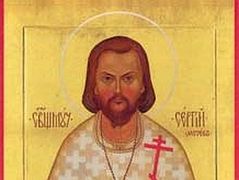For many people Fr. Sergei Mechev is somewhat overshadowed by the figure of his great father—Elder Alexei Mechev. There is no arguing with that. There would have been no Fr. Sergei but for Elder Alexei. That is true. However, it is also true that in Fr. Sergei Elder Alexei saw not only his son but also his worthy successor. He prayed and waited for Fr. Sergei to become the spiritual father of the community of his St. Nicholas Church at Maroseika Street. His expectations were justified. God alone knows how much it cost Fr. Sergei. As opposed to the Righteous Alexei, he was not an elder when he took this community under his wing.
As Metropolitan Anthony of Sourozh has justly asserted, you cannot “become” a true elder. This task is as unrealistic as the task of becoming a composer or a genius physicist. No university will ever make you a man of genius; neither will the communication with or a blood relation to another genius do. It is a talent, a gift from God. And the Lord bestowed the great gift of spiritual guidance on Fr. Sergei. This came not immediately but through hard labors of many years.
***
Fr. Sergei performed the ascetic labor of entering into the Patristic tradition. Reading and studying Patristic works is useful and fine, but that is not sufficient. That is why the great dogmatist Archpriest Georges Florovsky put the question of the need for a Neo-patristic synthesis. What does it mean? In the conditions of our age we should turn to the Patristic tradition and see it as a single spiritual phenomenon, as the Church Tradition spanning from the Antiquity to our days and till the end of times. And we should feel the Christian spirit of the Holy Fathers deeply and then address the challenges of our age by considering contemporary issues from patristic positions. Fr. Georges held that the Holy Fathers of various epochs are the witnesses to the eternal Truth, so they were well ahead of their time and will be relevant in all times.
Archpriest Georges Florovsky worked on his patristic synthesis as a theologian and a dogmatist. Frankly speaking, that is not his discovery because we first find the patristic synthesis in St. Maximus the Confessor in the early Middle Ages. The Holy Hierarchs Philaret (Drozdov) and Theophan the Recluse in the nineteenth century had their patristic syntheses too. Reading Fr. Sergei Mechev, you come to realize that he gradually developed his patristic synthesis as well.
Fr. Sergei didn’t study patristic works to prepare for theological lectures or academic conferences; rather, he did it for his pastoral ministry. He understood that by turning to the Holy Fathers we aren’t sliding back into the past; rather, we are preparing a solid foundation for the future. Fr. Sergei was absorbed in the spirit of the holy fathers so deeply that his talks and letters attain the level of the Fathers. The patristic level! I realize that this assertion sounds daring.
The Orthodox theologian Jean-Claude Larchet recently boldly called St. Silouan the Athonite a holy father. Larchet knows Greek Patristics perfectly well, he works with very complicated texts of St. Maximus the Confessor, and is aware that St. Silouan only attended a village school for two years and left behind instructions in “too simple” words. Nevertheless Elder Silouan is a holy father. Likewise, we can say the same of Fr. Sergei Mechev: “This is Russian patristics, here is a holy father before us.” In 1942, four years after St. Silouan’s blessed repose, Fr. Sergei Mechev shed his blood as a martyr.
***
I offer two examples to support my statement. Firstly, Fr. Sergei had an acute need for the fathers when he read the Bible. He absorbed the Patristic wisdom avidly. In the 1920s, during one of his talks to parishioners he said that the monks of ancient Egypt noted that saints would always copy the Gospel and follow it; but now the time has come when people read, copy the Gospel and then put it by the window. So the starting point for Fr. Sergei is that we should read the Holy Scriptures by our deeds and not just with our eyes, comprehending them with our mind and memorizing them.
To make this more convincing, Fr. Sergei cites Sts. Mark the Ascetic and Maximus the Confessor. The pastor beckons: Let us begin to work in Christ bit by bit, and the mysteries of God in the Holy Scriptures will be gradually revealed to us; it is hard for us to walk this path alone, so let us take all we need the most from the holy fathers for our journey; the fathers first obeyed and fulfilled the commandments in practice and then taught the other Christians (cf. Mt. 5:19). For Fr. Sergei the New Testament is first and foremost the commandments of God—that is, he was above all interested in the ascetic meaning of Biblical revelation. And Fr. Sergei stresses that Biblical revelation has been passed on from one Holy Father to another in the Church down the centuries1. Fr. Sergei considers walking the path of our own interpretation of the Word of God as a mistake and a wrong approach to the Bible.
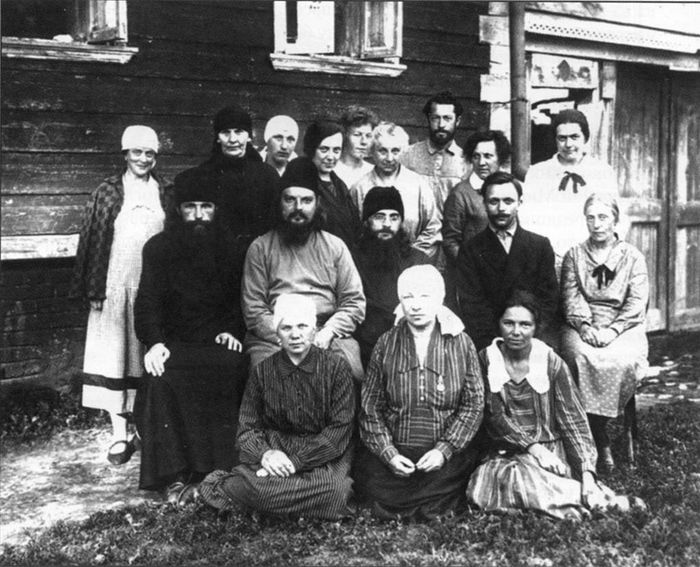 Priest-Martyr Sergei Mechev and Archimandrite Boris (Kholchev)
Priest-Martyr Sergei Mechev and Archimandrite Boris (Kholchev)
Fr. Sergei suggests that we start studying the Bible by considering the few commandments that we have already made ascetic efforts to obey—then the rest will be revealed to us in the Bible as well.
True, some will say that in our days many have their Gospel on the shelf or in a file that they can open by making two clicks (though they are too busy to do even that). That is the trouble! Fr. Sergei advises such people “to read if only a chapter from the Holy Scriptures a day; let them feel that they are debtors in the face of all the commandments.”
Feeling that you are a debtor before God and His commandments is a feeling of remorse and in effect a great step forward on the spiritual path. But that’s only outward knowledge of the Word of God. A deeper and inner knowledge of the Bible lies ahead of them, when readers “begin to obey the Law of God if only in one small commandment; then the whole of the Divine Law will be revealed to them by degrees.” Doesn’t Fr. Sergei speak of the struggle with sin here?
This is the path of life according to the Holy Scriptures that Fr. Sergei saw: I am not alone on this journey, the holy fathers are with me; they are the successors of the Apostles, they will explain the meaning of the Holy Scriptures to me. The holy fathers give us more—a living example of how the Scriptures are understood by deeds. The Word of God is understood by actions growing out of the daily reading of the New Testament and the fulfilment of one commandment each day.
***
Secondly, Fr. Sergei refers to the Ladder of Divine Ascent in his talk on prayer to parishioners. And he enters the spirit of the Patristic book by St. John Climacus to such a degree that, while relating the medieval monastic text carefully, he also offers laypeople a modern reading of Patristics. On the one hand, this is precisely the neopatristic synthesis; and, on the other hand, there is something greater here, namely real Russian patristics. That’s more than some useful reflections of a Russian priest on Greek Patristics.
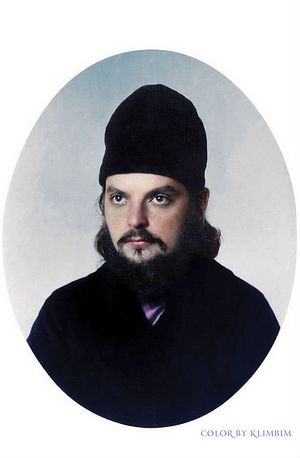 Priest-Martyr Sergei Mechev Thus, Climacus says that prayer has as its beginning the chasing awayof external thoughts as soon as they appear; Climacus sees the middle of prayer as experience in enclosing the mind in the words of prayer; “and perfect prayer is rapture towards the Lord2.” Fr. Sergei proceeds to portray a scene from a journey on a Moscow tram:
Priest-Martyr Sergei Mechev Thus, Climacus says that prayer has as its beginning the chasing awayof external thoughts as soon as they appear; Climacus sees the middle of prayer as experience in enclosing the mind in the words of prayer; “and perfect prayer is rapture towards the Lord2.” Fr. Sergei proceeds to portray a scene from a journey on a Moscow tram:
“I am riding on a street car and passionately talking with someone. Despite the fact that I can hear the conversations of others I am fully focused on my words and the words of my companion. Suddenly I begin to catch up the other passengers’ words and am no longer listening to my companion attentively. Next I only pretend that I am talking with him. Likewise, in prayer we are distracted by thoughts and eventually stop praying; then our mind is enclosed in external thoughts and not in prayer, because we did not chase away the thoughts at the beginning of our prayer.”3
I have retold Fr. Sergei’s words in an abridged form here to demonstrate his striking like-mindedness with St. John Climacus. It is a mysterious consensus, continuity and succession in Christian thinking and not a fresh interpretation with a specific successful example.
In conclusion I will add that Fr. Sergei saw not only the image of spiritual ascent of Christians but also the image of their spiritual maturation in the Ladder of Divine Ascent. That is staggering! Fr. Sergei miraculously saw the image of maturation in the above cited text by Climacus on the beginning of prayer and on perfect prayer.
Fr. Sergei says that on the initial stage of their path, many people “lifted up their hearts to God” in prayer, felt the joy of God’s presence near them and to some extent felt that outward thoughts had been chased away, though only the perfect Christian can experience this in full. Beginners receive this gift not according to their merits or ascetic labors but in accordance with “spiritual pedagogy”: God grands us this in the period of our spiritual infancy, as it were. It is followed by the period of trials, the struggle for the acquisition of the experience of grace: it is through acquiring the Holy Spirit of God that the purpose of human life is acquired, as we know from St. Seraphim of Sarov4. The acquisition of a spiritual gift from God is spiritual maturity or eldership5. Fr. Sergei’s spiritual children recalled that by the end of his life the Lord crowned his pastoral labors by the grace of eldership.
Here I will finish speaking about Fr. Sergei Mechev’s difficult spiritual ministry. He loved God, His Word, he entered into the mind of the Holy Fathers, their labors, their podvigs, and their spiritual experience.

